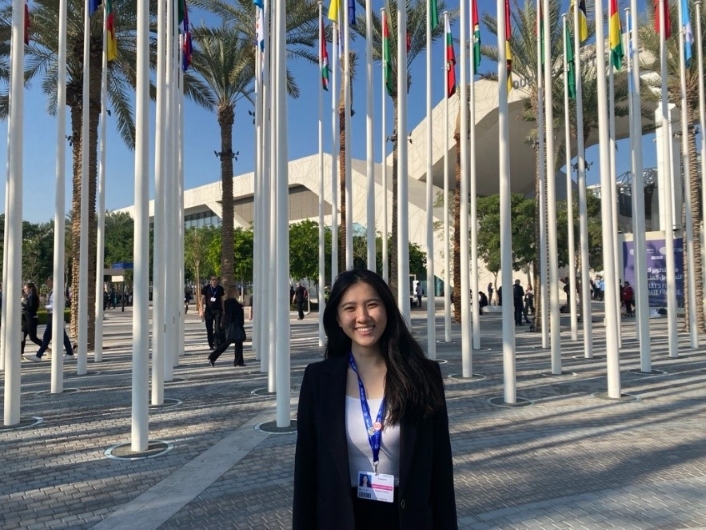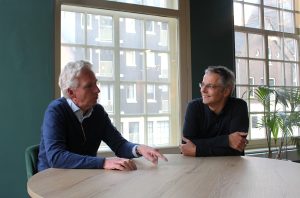Youth Climate Entrepreneurship: perspectives from a COP 28 Singapore youth delegate
Grace Chiang is a Consultant in the Singapore office and a youth delegate for Singapore to the COP. She shares her experience on promoting youth entrepreneurship in climate at the COP and in her daily work at Steward Redqueen.
At COP 28, I was surrounded by a global community looking to shift the future of this planet, but no voice was louder than that of the youth. This is rightfully so as we are the generation that will bear the burden of the decisions made today.
I attended COP 28 in the capacity of a youth delegate for Singapore, where I was given the opportunity to engage others on the topic of youth climate entrepreneurship – where young people create and run initiatives that provide new solutions to address environmental and social challenges.
My familiarity with youth climate entrepreneurship stems from my work at Steward Redqueen, where I speak to entrepreneurs and investors to understand their objectives and provide advice on how to realistically integrate sustainability and impact into their operations. In this article, I leverage on my experience as a youth delegate and a consultant at Steward Redqueen to highlight key opportunities and challenges for youth climate entrepreneurs.
The panel
Together with a group of Singapore youth delegates, we hosted a panel and breakout discussions on youth entrepreneurship. We were privileged enough to have four engaging speakers from across the globe candidly share about their experiences as youth entrepreneurs and those working within the startup ecosystem. The conversation addressed three main themes: (i) making a difference as youth entrepreneurs in the climate space, (ii) navigating climate financing, and (iii) building a conducive and equitable entrepreneurial ecosystem. I highly encourage you to watch the full panel here.
The panellists spoke to how youth climate entrepreneurs can make a genuine difference by not only understanding complex climate issues and the existing systems that propagate them, but also interacting with those affected by climate change. Making a genuine difference is then the ability to empathise, think beyond these systems and innovate new solutions. Concurrently, these solutions should be nuanced — ‘disruptive’ but not disconcerting. In their journey to leave an impact, youth entrepreneurs can leverage their position as the generation that will live with these climate challenges. This entails proactively pursuing solutions that others shy away from and boldly asking for help and guidance.
When it comes to climate finance funding, it was noted that more investors are entering the space, however the ease of access to funding for entrepreneurs in the Global North and South remains starkly different. The relative lack of regulatory and industrial infrastructure in the Global South deters investors and hinders business operations. For enterprises in the Global South with a social impact agenda, the colonial attitudes of Global North consumers and investors also sometimes leads to ‘dehumanising’ branding. This is when the marketability of poverty takes precedence over highlighting the skills of those benefiting from the investments e.g. local artisans. Globally, youth entrepreneurs find it challenging to attract climate finance when trying to move an enterprise from development to scale – especially for solutions that address ‘niche’ climate issues. For example, investors tend to overlook the textile industry in the Global South and focus funding on agriculture. Additionally, the competition for already-limited funds is amplified for youth as they compete against ‘older’ entrepreneurs that are perceived as safer investments.
Support for youth climate entrepreneurs needs to come from a conducive and equitable entrepreneurial ecosystem. To achieve this, there needs to be more cross-collaboration which requires breaking down divisions across stakeholders such as policymakers, academia and entrepreneurs. It was observed that potentially viable climate solutions exist, but many are at a low technology readiness level. Cross-collaboration is then essential with marketers playing a vital role in communicating to investors why these solutions should be scaled. Furthermore, the disconnect between decision-makers and investors in the Global North and youth entrepreneurs in the Global South delays solving critical systemic issues.
Final thoughts
Leaving Dubai after a week, it became clear that every COP should be the last one. Although getting to the last COP seems idealistic after 28 years of trying, it was heartening to see multitudes of people keeping that aspiration alive through continued efforts to support and raise awareness for youth climate action. The next step is to continue working outside the COP process to push the climate agenda further in a fair and inclusive manner. As a youth delegate and in my work at Steward Redqueen, I am eager to be a part of the generation that brings this home.
















